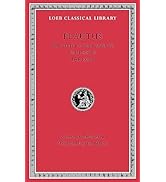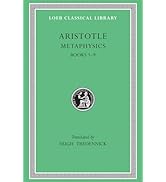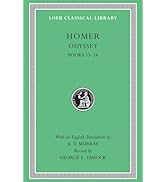
Download the free Kindle app and start reading Kindle books instantly on your smartphone, tablet, or computer - no Kindle device required.
Read instantly on your browser with Kindle for Web.
Using your mobile phone camera - scan the code below and download the Kindle app.

Follow the authors
OK
Dio Cassius: Roman History, Volume IX, Books 71-80 (Loeb Classical Library No. 177) Hardcover – January 1, 1927
Purchase options and add-ons
A sweeping chronicle from Aeneas to Alexander Severus.
Dio Cassius (Cassius Dio), circa AD 150–235, was born at Nicaea in Bithynia in Asia Minor. On the death of his father (Roman governor of Cilicia) he went in 180 to Rome, entered the Senate, and under the emperor Commodus was an advocate. He held high offices, becoming a close friend of several emperors; he was made governor of Pergamum and Smyrna; consul in 220; proconsul of Africa; governor of Dalmatia and then of Pannonia; and consul again in 229.
Of the eighty books of Dio's great work Roman History, covering the era from the legendary landing of Aeneas in Italy to the reign of Alexander Severus (AD 222–235), we possess Books 36–60 (36 and 55–60 have gaps), which cover the years 68 BC–AD 47. The missing portions are partly supplied, for the earlier gaps by Zonaras, who relies closely on Dio, and for some later gaps (Book 35 onwards) by John Xiphilinus (of the eleventh century). There are also many excerpts. The facilities for research afforded by Dio's official duties and his own industry make him a very vital source for Roman history of the last years of the republic and the first four emperors.
The Loeb Classical Library edition of Dio Cassius is in nine volumes.
- Print length592 pages
- LanguageEnglish
- PublisherHarvard University Press
- Publication dateJanuary 1, 1927
- Dimensions4.25 x 1.1 x 6.37 inches
- ISBN-109780674991965
- ISBN-13978-0674991965
From #1 New York Times bestselling author Colleen Hoover comes a novel that explores life after tragedy and the enduring spirit of love. | Learn more
Frequently bought together

Customers who viewed this item also viewed
From the brand

Editorial Reviews
About the Author
Product details
- ASIN : 0674991966
- Publisher : Harvard University Press (January 1, 1927)
- Language : English
- Hardcover : 592 pages
- ISBN-10 : 9780674991965
- ISBN-13 : 978-0674991965
- Item Weight : 11.2 ounces
- Dimensions : 4.25 x 1.1 x 6.37 inches
- Best Sellers Rank: #647,001 in Books (See Top 100 in Books)
- #582 in Ancient & Classical Literary Criticism (Books)
- #5,951 in Folklore (Books)
- Customer Reviews:
About the authors

The Loeb Classical Library is the only existing series that, through original text and English translation, gives access to all that is important in Greek and Latin literature.

Discover more of the author’s books, see similar authors, read book recommendations and more.
Customer reviews
- 5 star4 star3 star2 star1 star5 star87%13%0%0%0%87%
- 5 star4 star3 star2 star1 star4 star87%13%0%0%0%13%
- 5 star4 star3 star2 star1 star3 star87%13%0%0%0%0%
- 5 star4 star3 star2 star1 star2 star87%13%0%0%0%0%
- 5 star4 star3 star2 star1 star1 star87%13%0%0%0%0%
Customer Reviews, including Product Star Ratings help customers to learn more about the product and decide whether it is the right product for them.
To calculate the overall star rating and percentage breakdown by star, we don’t use a simple average. Instead, our system considers things like how recent a review is and if the reviewer bought the item on Amazon. It also analyzed reviews to verify trustworthiness.
Learn more how customers reviews work on AmazonTop reviews from the United States
There was a problem filtering reviews. Please reload the page.
- Reviewed in the United States on October 28, 2011Since there are so many of these darn things the review shall be divided into three sections. First, a brief description of the Loeb series of books and their advantages/disadvantages. Second shall be my thoughts on the author himself, his accuracy, as well as his style and the style of his translator. This is of course only my opinion and should be treated as such. The final part shall review what this particular book actually covers.
The Loeb series date back to the turn of the last century. They are designed for people with at least some knowledge of Greek or Latin. They are a sort of compromise between a straight English translation and an annotated copy of the original text. On the left page is printed the text in Greek or Latin depending on the language of the writer and on the right side is the text in English. For somebody who knows even a little Greek or Latin these texts are invaluable. You can try to read the text in the original language knowing that you can correct yourself by looking on the next page or you can read the text in translation and check the translation with the original for more detail. While some of the translations are excellent mostly they are merely serviceable since they are designed more as an aid to translation rather than a translation in themselves. Most of them follow the Greek or Latin very closely. These books are also very small, maybe just over a quarter the size of your average hardcover book. This means that you'll need to buy more than just one book to read a complete work. They are also somewhat pricey considering their size. The Loeb Collection is very large but most of the more famous works can be found in better (and cheaper) translations elsewhere. If you want to read a rarer book or read one in the original language then you can't do better than the Loeb Editions.
Cassius Dio's History is available in nine books in the Loeb series. Dio was a senator in the early third century who wrote a history from the beginning of Rome through to his own times. His last political position was that of consul under Alexander Severus. Apart from that there's pretty much nothing known of Dio's life. For the second and third century his is the biggest voice. For the first century AD his work fills in a lot of the gaps left by the fragmented state of Tacitus. For the late Republican and early Imperial period his work survives mostly intact and offers the best continuous narrative we have. All of his earlier stuff is rubbish. There are many problems with his work. To start with the most obvious, his work is mostly lost. The portions that survive are fragmented or epitomes of his actual work. The main epitomators are Zonaras and John Xiphilinus, who wrote in the 11th and 12th Century. The only section that survived relatively intact is the part dealing with the later Republic. Obviously this is a problem when dealing with an ancient author since you don't know what details his epitomator misunderstood or left out. The other major problem is his vagueness. Unlike earlier historians (all of whom covered a smaller period) Dio is not as precise as might be liked, often including phrases like "a few years later" or "a great many." This is a problem common with a lot of later historians. So much history is based off Dio that it is scary how little of his actual words survive. A useful source for the latter part (and beyond) is Herodian (Volume I, Volume II).
This volume covers the years 161-229 AD. You may notice it skips a few years from the last one. this covers Antoninus Pius through Alexander Severus. Since Alexander was the emperor under whom Dio started writing there is precious little data on him. This is the only narrative source for the Antonines and the Severans apart from Herodian so its usefulness is hard to overstate.
Top reviews from other countries
 Arch StantonReviewed in the United Kingdom on December 4, 2011
Arch StantonReviewed in the United Kingdom on December 4, 20115.0 out of 5 stars The Antonines and the Severans
Since there are so many of these darn things the review shall be divided into three sections. First, a brief description of the Loeb series of books and their advantages/disadvantages. Second shall be my thoughts on the author himself, his accuracy, as well as his style and the style of his translator. This is of course only my opinion and should be treated as such. The final part shall review what this particular book actually covers.
The Loeb series date back to the turn of the last century. They are designed for people with at least some knowledge of Greek or Latin. They are a sort of compromise between a straight English translation and an annotated copy of the original text. On the left page is printed the text in Greek or Latin depending on the language of the writer and on the right side is the text in English. For somebody who knows even a little Greek or Latin these texts are invaluable. You can try to read the text in the original language knowing that you can correct yourself by looking on the next page or you can read the text in translation and check the translation with the original for more detail. While some of the translations are excellent mostly they are merely serviceable since they are designed more as an aid to translation rather than a translation in themselves. Most of them follow the Greek or Latin very closely. These books are also very small, maybe just over a quarter the size of your average hardcover book. This means that you'll need to buy more than just one book to read a complete work. They are also somewhat pricey considering their size. The Loeb Collection is very large but most of the more famous works can be found in better (and cheaper) translations elsewhere. If you want to read a rarer book or read one in the original language then you can't do better than the Loeb Editions.
Cassius Dio's History is available in nine books in the Loeb series. Dio was a senator in the early third century who wrote a history from the beginning of Rome through to his own times. His last political position was that of consul under Alexander Severus. Apart from that there's pretty much nothing known of Dio's life. For the second and third century his is the biggest voice. For the first century AD his work fills in a lot of the gaps left by the fragmented state of Tacitus. For the late Republican and early Imperial period his work survives mostly intact and offers the best continuous narrative we have. All of his earlier stuff is rubbish. There are many problems with his work. To start with the most obvious, his work is mostly lost. The portions that survive are fragmented or epitomes of his actual work. The main epitomators are Zonaras and John Xiphilinus, who wrote in the 11th and 12th Century. The only section that survived relatively intact is the part dealing with the later Republic. Obviously this is a problem when dealing with an ancient author since you don't know what details his epitomator misunderstood or left out. The other major problem is his vagueness. Unlike earlier historians (all of whom covered a smaller period) Dio is not as precise as might be liked, often including phrases like "a few years later" or "a great many." This is a problem common with a lot of later historians. So much history is based off Dio that it is scary how little of his actual words survive. A useful source for the latter part (and beyond) is Herodian (Volume I, Volume II).
This volume covers the years 161-229 AD. You may notice it skips a few years from the last one. this covers Antoninus Pius through Alexander Severus. Since Alexander was the emperor under whom Dio started writing there is precious little data on him. This is the only narrative source for the Antonines and the Severans so its usefulness is hard to overstate.













































































